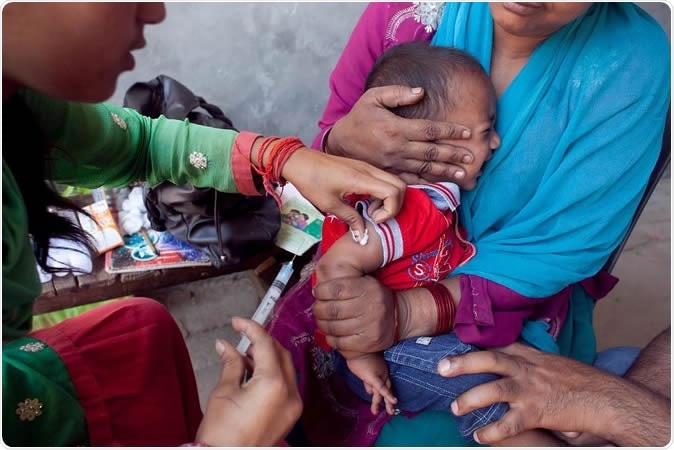The novel coronavirus disease, now officially called COVID-19, threatens the vaccination of millions of children across the globe. With most countries in lockdown and health care workers overwhelmed, many vaccination schedules have been delayed, threatening the welfare of infants and children.
With vaccinations postponed as families stay at home and practice social distancing, children are at an increased risk of contracting other diseases, such as measles. The World Health Organization (WHO) and the U.N. Children’s Fund (UNICEF) noted that measles immunization campaigns had been delayed in 24 countries, while 13 other countries have canceled them temporarily to focus on fighting the coronavirus disease.

Moradabad, Uttar Pradesh, India. Measles shot administered to 11-month-old Armaan as his mother Fatima clutches him. Photo credit: UNICEF/India/Sumit Dayal
Health agencies, including WHO, the UNICEF, the Americana Red Cross, and the U.S. Centers for Disease Control and Prevention (CDC) that support the Measles & Rubella Initiative (M&RI) are cautioning that millions of children and infants across 37 countries are at risk of having delayed and missed vaccine shots despite the call of the WHO to continue and sustain immunization efforts during the pandemic. Further, the WHO encourages these vulnerable countries to weigh the risks of delaying vaccine campaigns against that of coronavirus transmission.
“If the difficult choice to pause vaccination is made due to the spread of COVID-19, we urge leaders to intensify efforts to track unvaccinated children, so that the most vulnerable populations can be provided with measles vaccines as soon as it becomes possible to do so”, the statement said.
Risks of measles
Over the past years, several measles outbreaks have cropped up across the globe. The most recent one in the United States was in 2019, where 1,282 people were confirmed in 31 states. Of these cases, 128 were hospitalized, and 61 had complications, including encephalitis and pneumonia.
The 2019 outbreak recorded the highest number of cases since 1992, and more than 73 percent of the cases were tied to New York, which is also the hardest-hit U.S. state in the current novel coronavirus outbreak. Most of the measles cases reported were among people who were not vaccinated against the virus. This year as of April 5, 2020, there have been 12 confirmed cases in 7 jurisdictions in the U.S. All cases were caused by measles wild-type D8 or B3 (genotypes).
In the Pacific region, an outbreak hit Samoa in September 2019. As of January 6, 2020, there were over 5,700 cases of measles and 83 deaths, out of a Samoan population of 200,874. Over three percent of the population was infected. The cause of the outbreak was attributed to decreased vaccination rates, from 74% in 2017 to 31–34% in 2018. A state of emergency was declared on November 17, ordering the closure of all schools, keeping children under 17 away from public events, and vaccination became mandatory. As of December 22, 2019, an estimated 94% of the eligible population had been vaccinated. The outbreak in Samoa was caused by the D8 strain (genotype) of measles virus
Despite having an effective vaccine for five decades, there was a surge of measles cases in 2018, claiming more than 140,000 lives worldwide, mostly infants and children.
The most common signs and symptoms of measles include high fever, cough, rhinitis, runny nose, and conjunctivitis.
In children, the risk of complications against measles is also high among those who were not vaccinated. These complications include ear infections and diarrhea. Serious complications include pneumonia, encephalitis or swelling of the brain, and respiratory and neurologic complications.
People who are at the highest risk of measles complications include children below five years old, pregnant women, and those with compromised immune systems, like those with leukemia and HIV infection.
Parents and caregivers play pivotal roles in ensuring the health of their children by having them vaccinated. They should make sure vaccine schedules are followed, as long as social distancing is observed. The agency’s statement urged countries to implement effective communications strategies to ensure there is enough supply of vaccines and help assure a healthy life for children, particularly in this challenging time.